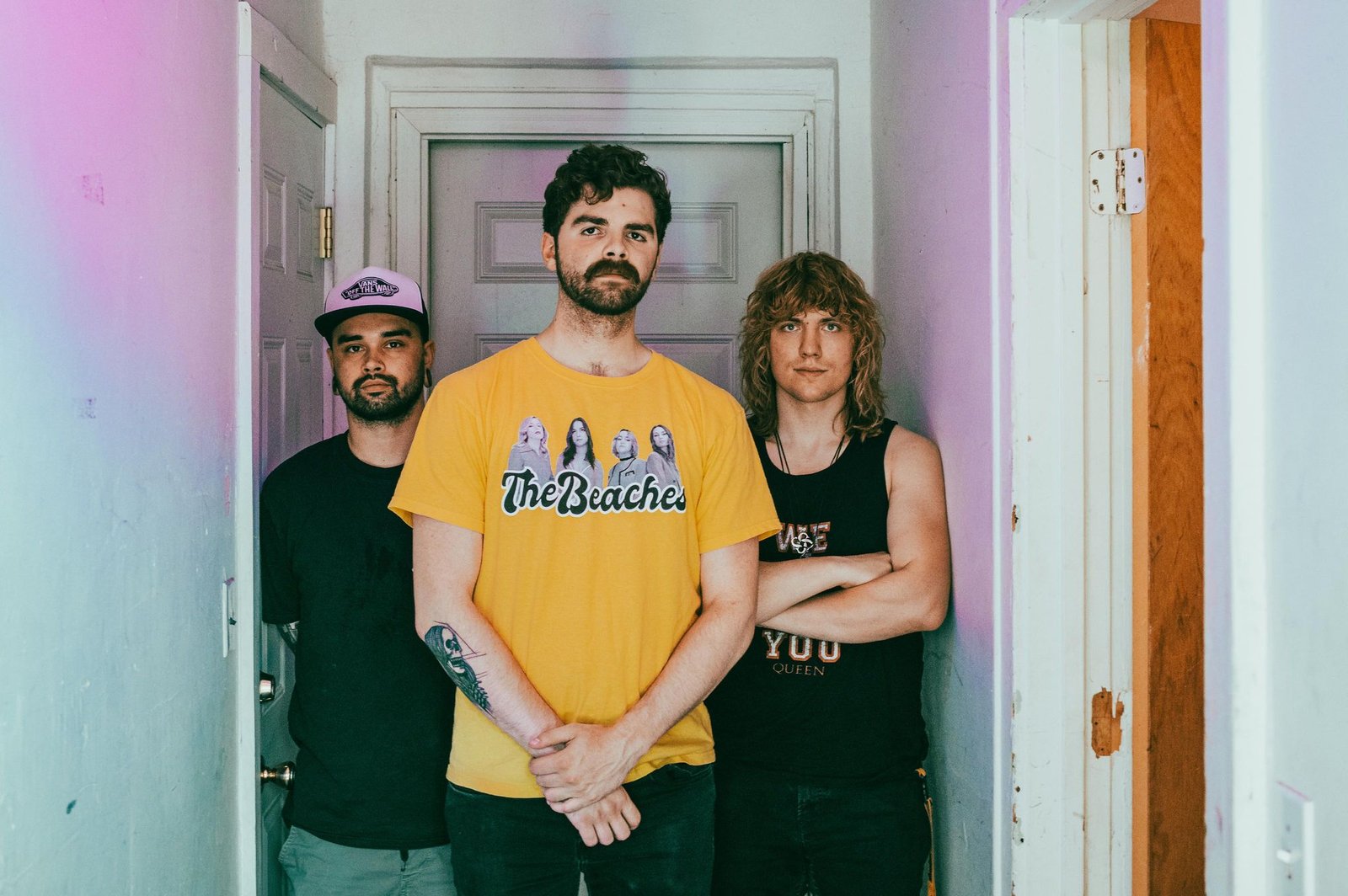One of my favourite things about playing live music is getting the opportunity to meet some exciting up-and-coming acts. Alien to the Ignorant, our current Weekly Featured Artist, is just such a band. I have had the privilege of playing with them at shows and a festival over the past few months and have always been astounded by the trio’s dynamic two-vocal approach, onstage banter, hooks, breakdowns, and progressive politics. I’m now excited for all of you to start to understand what captivated me about Alien to the Ignorant.
Let’s start with the name. Guitarist and vocalist Swade Orchard started the post-hardcore project in Saskatoon, Canada in 2015 or 2016, posting songs under the moniker Alien to Idiots on Instagram. This online presence led to a complete stranger reaching out. He became the band’s original drummer and brought along his brother, who was the band’s first bassist, until Myk (vocals, bass, production) joined the group a few months later. It was not long after that Alien to Idiots changed their name, as Swade explains:
‘The name change came a couple months in as well. The message I wanted to get across being that the things people have in common are much more powerful and meaningful than their perceived differences, and ignorance, willful or not, prevented people from seeing that.’
The group’s first release, 2017’s Irrelevance, captured four songs Orchard had composed as the act came together. A track like “Paper Liar” showcases the roots of the band, using knotted guitar riffs and time signatures, clean/scream dynamics, and anthemic post-hardcore melodies and breakdowns that have only evolved over the Proteus I and Proteus II EPs before culminating on the group’s most polished, cohesive release yet, the 2021 full-length A Dying Art. Bassist Myk Ulan-Hohol contrasts this most recent release with their previous work:
‘It’s been a lot more collaborative. It also marked me personally really honing this in as my band, and less just jamming out. We wanted to making something as heavy as we could, and as heavy as we wanted, music that resembled what we were feeling for a long time. Not that our old stuff was half-assed or anything, but I feel it’s when we became the most emotionally invested in what we were making, and why.’
However, not just collaboration made the record what it is. The pandemic resulted in the band’s North American tour falling apart and a great deal of difficulty in all of the band members’ lives. Myk explains:
‘A Dying Art was a culmination of many things, but to narrow it down, it’s our most honest release yet. We, like everybody, have a lot of shit going on, for a long time. Swade literally just said to me one time, ‘I just wanna make the heaviest thing we can’, citing our disbelief in making it in music, being sick of the world and feeling like life was predetermined for us. We wanted to write up shit that hurts. The album features songs about government crimes, relationship abuse, ED’s, addiction, etc.’
A song like “Biggus Dickus” fuses that sense of anger and futility in interconnected political and personal spheres with a mixture of elements that draw disparate comparisons to Every Time I Die, The White Stripes, and The Fall of Troy. The back-and-forth spoken word sections build tension before massive riffs and breakdowns provide a catharsis for the listener that I can only imagine was experienced by the band as they wrote the track. The political nature of the song is furthered by the group’s live performances, which feature sharp, witty banter between Myk and Swade, as well as passionate observations about injustices facing Indigenous peoples and the 2SLGBTQIA+ community. This passion for social issues is core to the band, as Swade explains:
‘In essence, we’re a punk band, and I think what’s important to remember is that the punk community always has to represent and support the people, especially those routinely targeted by systemic violence and aggression. To have learned from so many people about their experiences and not get pissed off at those responsible is crazy to me. To play punk music as a bystander defeats the purpose.’
This ethos is foundational to the Alien to the Ignorant, and only strengthens their live performances. The natural dialogue, explosive energy, and mix of humour and political observations are built on a foundation of rehearsal and spontaneity that involves many hours playing together and changing up set lists to avoid monotony for themselves as performers or their audience. It is this ethic and spontaneity that is beautifully captured by the song and music video for “Give Up”. The track is a straightahead hardcore burst that wastes no time over its 78 seconds, opening A Dying Art with just the level of heaviness the group promised. However, its accompanying music video acts as a bit of a behind-the-scenes that showcases the band’s humour and playfulness.
With A Dying Art approaching its second birthday and a substantial amount of touring since its release, Alien to the Ignorant are writing new songs between shows and plotting their next release. In the meantime, though, Myk leaves us with some parting words:
‘Keep your scene alive. Punk is not dead, rock is not dead. It’s only dead if we stop loving it. Go out to a show, even if you don’t know who it is, and bring some of your best friends. Provided they’re not self-serving ‘rockstar’ assholes, bands live for you as us fans live for them. And it’s the most beautiful thing about music. The artist is not above the audience, the audience is not above the artist. We are all loving the same damn thing, and we’re all a little crazy for it. And if you haven’t yet, pick up an instrument. Start a band with some people you love.’
Alien to the Ignorant is:
Swade Orchard – Guitar, Lead Vocals
Myk Ulan-Hohol – Bass, Vocals, Keys, Production
Johnny Becker – Drums
You can follow Alien to the Ignorant on Facebook and Instagram. You can listen to their music on Bandcamp.






